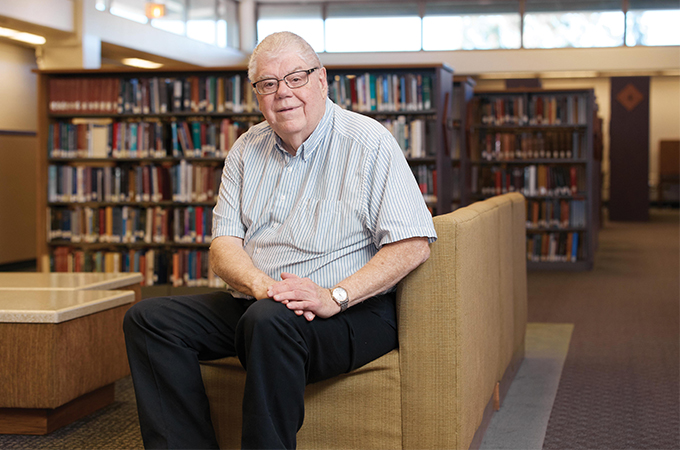When he enrolled at North Dakota State University, Professor Emeritus David Bragg—who went on to teach in the University of Redlands mathematics department for 32 years—did not plan to study mathematics. Instead, he started out as a chemistry major. But, as a junior, he realized he disliked organic chemistry but enjoyed and excelled at the math.
After embracing mathematics as his new field, Bragg completed a master’s degree at North Dakota and Ph.D. at Arizona State University. Still, he felt his calling went beyond being a mathematician. Submitting his curriculum vitae to the U of R in 1967 after meeting faculty member Sandy Sanderson, he wrote: “I am a teacher rather than a mathematician. I would much rather see the light of understanding some mathematical concept come into the eyes of a learner than prove the most complicated mathematical theorem.”
After teaching several years at the University’s College of Arts and Sciences (CAS), Bragg was “borrowed” by Johnston College (now the Johnston Center for Integrative Studies), where he served eight years as a founding faculty member before returning full-time to the CAS mathematics department. Bragg continues to be involved with Johnston’s living-learning community and says Johnston affected him personally, encouraging his budding political activism.
Throughout his career at Redlands, he appreciated the University’s commitment to personalized education. “Redlands was supportive in letting us develop our own teaching style,” he says. “I am really proud of what it has done in this area.”
In addition to his contributions in the classroom, Bragg served students by partnering with English Professor Eileen Cotter to start the first on-campus tutoring center. “We saw students having difficulties and wanted to help,” says Bragg.
He also had a pivotal role launching the Fletcher Jones Foundation Computer Center with Professors Bob Engel and Larry Harvill. “We started with one room and gradually increased,” says Bragg, who served for nine years as the center’s director—introducing the campus to the internet, the web, and email.
Before retiring in 1999, his contributions to the University also included serving as chair of the mathematics, engineering, and computer science departments; vice president for academic affairs; director of the Salzburg program; and Fulbright exchange professor.
Today, Bragg remains engaged in the U of R community and has helped to lead its retiree organization. “Many of our retired faculty are appreciative of what they received from the University,” observes Bragg. “Nearly all had the chance to teach in Salzburg, and experiences like that make people feel very loyal.”
Bragg’s own appreciation is expressed by his decision to include Redlands in his estate plans. In addition to provisions for the Johnston Founders’ Chair in Alternative Education and the Math Department Award Fund, Bragg is establishing two endowed scholarships—one for Johnston students, the other for math or computer science students.
“I have been supporting Redlands my entire adult life,” says Bragg. “I believe in private education, and students simply will not be able to afford it without scholarships.”
For information on how you can include the University in your estate plans like Bragg has, please contact Katie Cure, director of planned giving, at 909-748-8905 or katie_cure@redlands.edu.






